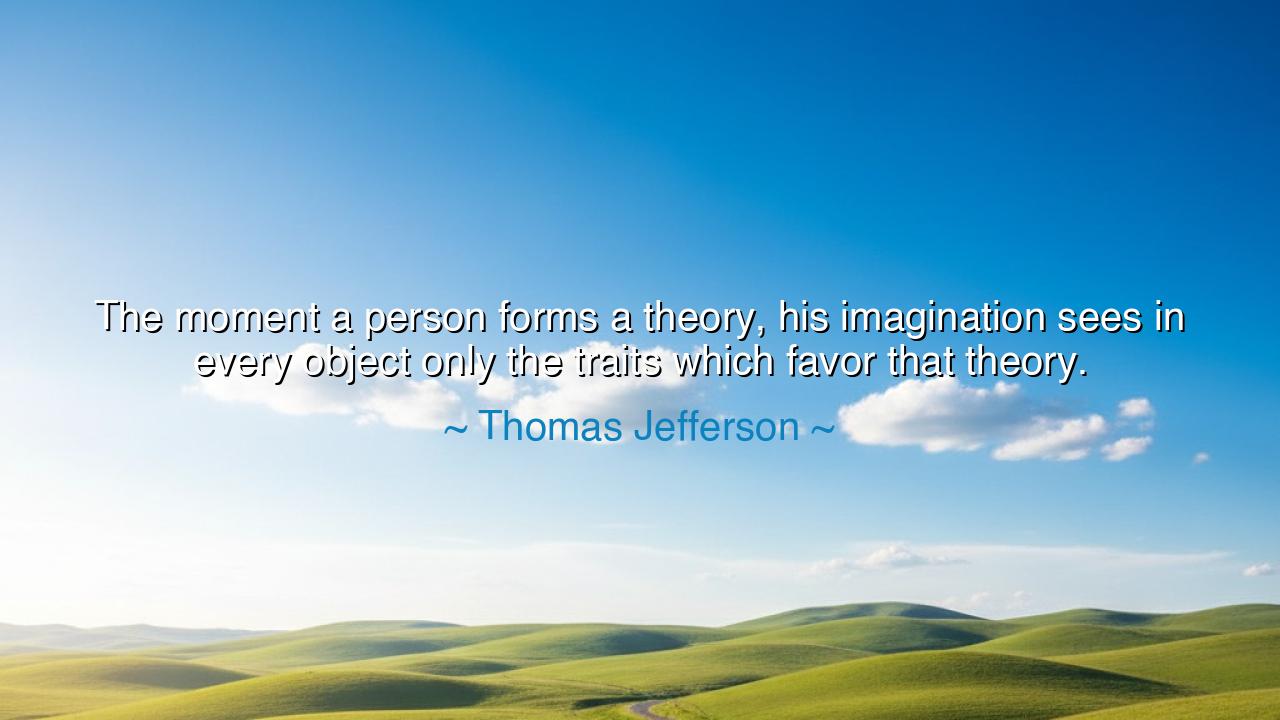
The moment a person forms a theory, his imagination sees in every
The moment a person forms a theory, his imagination sees in every object only the traits which favor that theory.






In the thoughtful and timeless words of Thomas Jefferson, one of the great architects of liberty and the mind, there shines a profound warning for all who seek truth: “The moment a person forms a theory, his imagination sees in every object only the traits which favor that theory.” Within this single sentence lies an entire philosophy of wisdom and caution — a reminder that the greatest strength of the imagination can also become its most subtle trap. Jefferson, that master of both reason and vision, knew that the human mind, once enchanted by an idea, begins to bend the world to its desire. It ceases to observe — it begins to confirm. The imagination, instead of illuminating truth, becomes a servant of its own illusion.
The meaning of this quote reaches to the very heart of human perception. Every man, once he gives birth to a theory, feels the joy of discovery — the sense of having found the key to the hidden order of things. But in that joy lies danger. The imagination, eager to defend its creation, begins to weave around it a tapestry of supporting evidence, ignoring or dismissing anything that might contradict it. Thus, what began as a pursuit of truth can swiftly turn into a defense of pride. Jefferson, who had studied science, philosophy, and politics alike, saw this pattern everywhere: in scholars who refused to abandon disproven ideas, in politicians who clung to policy despite its failures, and in ordinary men whose prejudices disguised themselves as certainties.
The origin of this insight can be traced to Jefferson’s life as both a scientist and a statesman. He was a man who revered reason and observation, following the Enlightenment belief that truth was born from inquiry, not dogma. Yet even within his own lifetime, he witnessed how men of intellect could become prisoners of their own beliefs. The Enlightenment itself, for all its brilliance, was sometimes guilty of replacing religious fanaticism with the fanaticism of reason — of declaring theories as absolute before the facts were complete. Jefferson’s words, then, were both a confession and a warning: that even the most rational mind is vulnerable to the seduction of imagination when it ceases to be humble before reality.
History provides countless examples of this truth. Consider the tale of Ptolemy, the ancient astronomer whose geocentric theory — that the Earth was the center of the universe — ruled human thought for nearly fifteen centuries. His model was elegant, his mathematics precise. And yet, when the imagination of humankind had been bound by that theory, every star, every movement in the heavens was seen only through its lens. Observations that contradicted it were dismissed or explained away. It was only when Copernicus, and later Galileo, dared to look beyond the veil of the accepted theory that the true structure of the cosmos was revealed. The stars themselves had not changed; it was the imagination that had been liberated.
Jefferson’s insight, however, reaches beyond science — it touches upon the moral and political life as well. How often do nations form theories about their own virtue, and then see the world only through the lens of that righteousness? How often does a man, convinced of another’s guilt or unworthiness, find in every gesture a sign that confirms his belief? This is the tyranny of the mind — the blindness born not of ignorance, but of conviction. The imagination, once enslaved by a theory, ceases to be a seeker of truth and becomes its censor. Thus, Jefferson warns us: the noblest mind must guard itself from the arrogance of certainty.
To live wisely, one must learn to balance imagination and reason, to let the heart dream but not dictate. The imagination gives birth to theories — and this is good, for progress begins with vision — but reason must test those visions against the hard stone of reality. When the evidence speaks against us, we must have the courage to listen. The truly enlightened person is not the one who never errs, but the one who can admit when their cherished idea has been proven false. For as the ancients taught, “To know that you do not know — that is the beginning of wisdom.”
So, my child, take this teaching as a guide for your own path. When you form a theory, whether in science, in love, or in life, hold it gently — not as a chain, but as a tool. Let your imagination soar, but let your eyes remain open. Seek not only the signs that affirm you, but also those that challenge you, for it is the friction of truth against belief that sharpens understanding. Doubt is not the enemy of faith or reason; it is their guardian. The mind that questions itself grows; the one that does not becomes a prisoner of its own creation.
And remember this final truth from Thomas Jefferson: that the imagination, though powerful, must bow before reality if it is to serve wisdom. For when a man loves his theory more than truth, he ceases to see — and when he ceases to see, he ceases to learn. The path of wisdom, therefore, is not the path of certainty, but of continual awakening — where the imagination and the mind walk together, humbly, toward the ever-unfolding light of truth.






AAdministratorAdministrator
Welcome, honored guests. Please leave a comment, we will respond soon